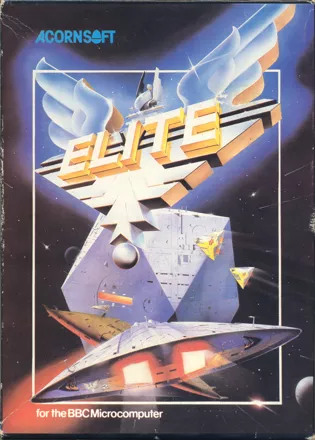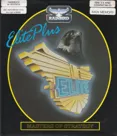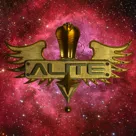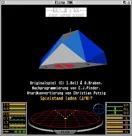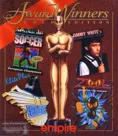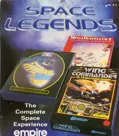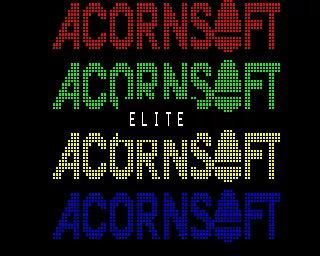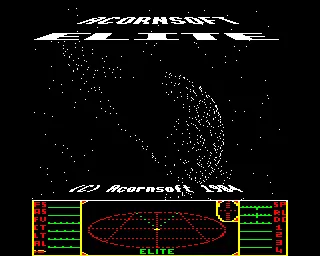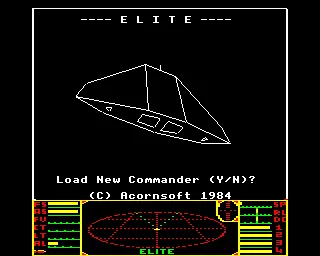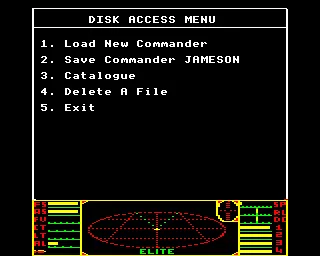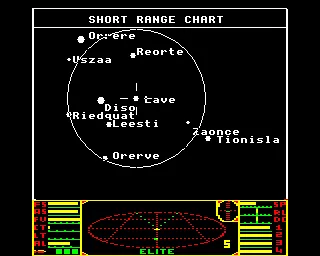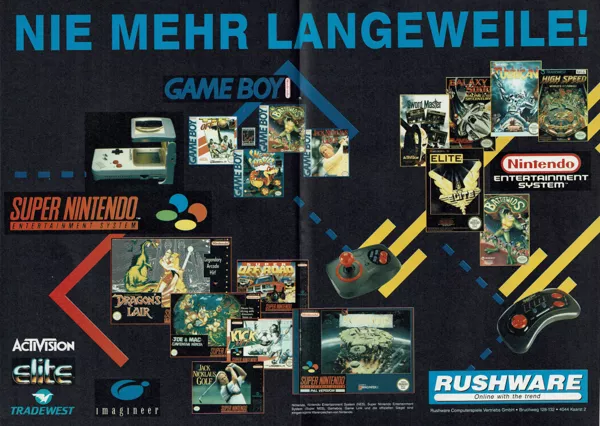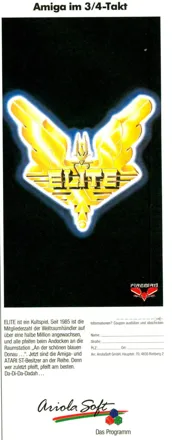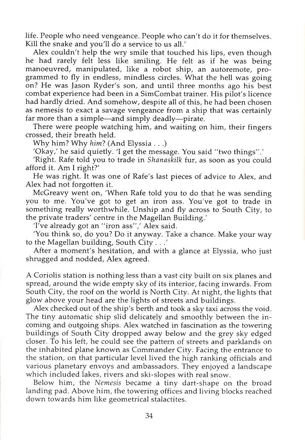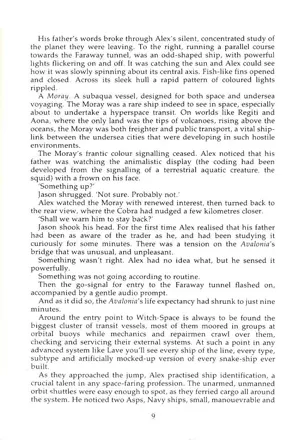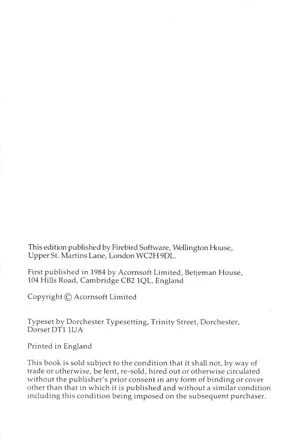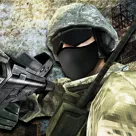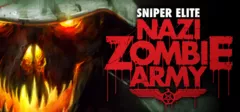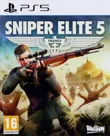Elite
-
 Elite
(1984 on
BBC Micro,
Electron)
Elite
(1984 on
BBC Micro,
Electron)
Description official descriptions
Elite is a free-form space trading and combat simulation, commonly considered the progenitor of this sub-genre. The player initially controls a character referred to as "Commander Jameson", starting at Lave Station with 100 credits and a lightly armed trading ship called Cobra Mark III. Most of the game consists of traveling to various star systems, trading with their inhabitants, gaining money and reputation. Money can also be gained by other means besides trading; these include undertaking military missions, bounty hunting, asteroid mining, and even piracy. As the player character earns money, he becomes able to upgrade his ships with enhancements such as better weapons, shields, increased cargo capacity, an automated docking system, etc.
The game utilizes pseudo-3D wire-frame graphics; its world is viewed from a first-person perspective. It has no overarching story, though a race known as Thargoids play the role of antagonists: their ships will often attack the player-controlled ship, forcing the player to engage in space combat. Combat is action-oriented, taking place in the same environment as the exploration. The player must use various weapons the ship is equipped with, as well as manoeuvre the ship, trying to dodge enemy attacks. The player can also choose to attack neutral ships; doing so will decrease the protagonist's reputation, eventually attracting the attention of the galactic police.
Elite is notable for its expansive game world, consisting of eight galaxies and 256 planets. The player is free to travel to any of these planets, provided his ship has enough fuel for the trip (the ship's fuel capacity is limited for a journey to the distance of seven light-years).
Groups +
Screenshots
Promos
Videos
Add Trailer or Gameplay Video +1 point
See any errors or missing info for this game?
You can submit a correction, contribute trivia, add to a game group, add a related site or alternate title.
Credits (BBC Micro version)
5 People
| Authors | |
| The Dark Wheel Author | |
| Copy protection | |
| Front cover illustration by |
Reviews
Critics
Average score: 88% (based on 44 ratings)
Players
Average score: 3.4 out of 5 (based on 133 ratings with 4 reviews)
Explore the galaxy on one 5 1/4 Floppy.
The Good
Really the ultimate 80s space combat game. Addictive game did not have any plot, instead you'd just fly around roasting pirates and trading goods to different planets while trying to get the cash to upgrade your ship.
Combat was the heart of this game and it was fast and furious. Fights involved many ships and made you do lots of dodging and weaving as you tried to line up your Military Lasers or avoid that missle when your ECM was out. The battle to destroy the Constrictor was a worthy challenge in its day.
In addition to the combat, what really drew me into the game was the trading and upgrading you could do. I hadn't played any game at this time that mixed combat and trading like this. It was really satisfying when you managed to make your run through a pirate infested anarchy world because you knew you would finally have the cash to get that fuel scoop upgrade you've had your eye on.
Also was the large universe to explore, there were 5 galaxies to with maybe a 1000 systems to visit in each, everyone who played this game knows the name Lave. Each galaxy had a special mission which was activated after doing a lot of space jumps. The first one involved tribbles, in the second galaxy you had to hunt down a stolen prototype ship, I never made it to the 3rd mission.
The game really left a lot to your imagination as there was no plot. Instead you had to fill in your own details as you pursued careers as a trader, bounty hunter, pirate or asteroid miner. Unlike in its sequels, careers other than trader were enjoyable although not as profitable. There was plenty of neutral ships for would be pirates to attack and asteroids were easy enough to find a mine.
Modern gamers are used to being able to save anywhere they like and this game you could only save in ports. I actually like that in this game because it made trading runs to dangerous systems that much more tense.
The Bad
Graphics aren't that good on the IBM, but they never were that hot an any system. The Commodore 64 version was essentally black and white wire frame graphics, so at least this one filled in the ships!
You can only fly one type of ship.
Tribbles!!
The Bottom Line
A classic and influential space combat/trader game. Newer games might have better graphics, sound and game options but NONE, including this games own sequels have had the magic of the orginal.
DOS · by woods01 (129) · 2001
The Good
This game in my opinion still holds me glued to a computer screen today, its not the fancy graphics or limited sound capabilities it was the sence of freedom i had and having faith in my Cobra MKIII could always get me out of a tight spot. Many places to explore unique traders selling there wares, Bounty Hunters after your hide, or that once in a lifetime special offer for the last speices of tribble.
After those first load up screens no other clone came remotely close save one but still it wasn't Elite.
The Bad
I if there is only one thing i didn't like about this game and that is with all good games time takes it's toll and many games companies try to update the game only to make a real hash of it and sometimes this is a good thing as it makes the original all the more valued.
The Bottom Line
Its an easy game to play but difficult to master, your ship maybe wireframe but she's cool, loads of trading opportunities places to go just fly in space and do your own thing.
Amstrad CPC · by Paul Wildman (2) · 2008
probably the most immersive non-roleplaying game of it's time
The Good
What's so special about Elite? Sitting hour after hour, day for day in front of a computer, reading a book, drinking coffee, every now and then throwing a glance at the monitor, to look for potential threats or the space station.
Well it's a little bit paradox, but I think in Elite the repetitive gameplay adds to the immersion.
You start out so inexperienced and poor and struggle to earn your first credits, cargo bay, beam laser, ... . And while struggling you learn how to handle your ship. And with time passing, suddenly you are a flying killer machine, shooting whole armies of pirates, before they even leave their one pixel state. And you feel rather cool doing so :-).
Add in unrestricted freedom to do what you want (be it mining, or piracy, trade or ...) and you have one of the greatest all time classics ever developed.
The Bad
After a long, long time it really get's boring.
The Bottom Line
How to make a living with a space ship or a 3D-space-action-shooter-trading-game placed in a universe of 6000(?) star systems.
DOS · by Zzap (56) · 2000
Discussion
| Subject | By | Date |
|---|---|---|
| Label vs Owner | Trypticon (11023) | Apr 2, 2013 |
Trivia
1001 Video Games
Elite appears in the book 1001 Video Games You Must Play Before You Die by General Editor Tony Mott.
Book
The book Game On! From Pong to Oblivion: The 50 Greatest Video games of All Time contains a chapter on Elite.
Competition
A World Championship was organised by Acornsoft in 1985, with a £1000 prize, the final held at the Electron & BBC Micro User Show in 1985. 17 year old student Paul Shonk of Croydon was victorious, against 11 opponents, nine of them teenagers, and all from the UK despite the 'world championship' moniker (unsurprisingly given that, when the competition was launched, the BBC Micro was the only version released)
Controversy
Elite's two creators, Ian Bell and David Braben, were not on the best of terms for a long time, ever since development on Elite 2 was cancelled. This erupted into open confrontation during 1999-2000 when Bell decided to release all versions of Elite as freeware. The dispute was settled and all files relevant to Elite and Braben's version of the matter can be found in Ian Bell's website.
Copy protection
The ZX Spectrum version used Lenslok as copy protection. Lenslok was a physical device with a lense unique to the game which had to be used to decipher a code (more information here). The first few hundred copies of the game were delivered with a faulty Lenslok device, rendering the game unusable.
DOS version
Two versions were supplied with the DOS release, Shaded and Line Drawn. At the selection screen this message is displayed regarding the shaded version: "...but unless your machine is powerful (6MHz 80286 or greater) it will not run very quickly and you should select the line drawn version."
Extras
The package came with a novella about how your father sacrificed himself and saved you by dumping you in the lone escape pod in the ship, and how you managed to "acquire" this ship that you are driving at the beginning of the game.
Freeware
Many of Elite's original releases are now available on Ian Bell's (one of the game's developers) homepage. These include hard to find MSX, NES and BBC Micro versions, to name a few.
Fan club
This was apparently the first game, or among the first games, to have a fan club.
Game On exhibition
Elite is being exhibited as part of the "Game On" exhibition in places like the London Science Museum. David Braben also gave a lecture as part of the exhibition in 2006.
Musical
Ian Bell's brother, Aidan Bell, enjoyed a spell of success writing for musical theatre; sooner or later his muse led him to his brother's enormous success story, which (believe it or not) resulted in 1989's completion of Elite: the Musical, furthering the storyline set forth in Robert Holdstock's novella The Dark Wheel. The book and lyrics, with mp3 recordings, (c) Pink Hippo Productions Ltd, can be perused.
Whether or not this musical has ever been produced on the off-Broadway stage is unclear, though one figures the chances are slim to nil.
Records
Elite (as of 2009) holds fours Guinness World Records. These are for the most format releases for a space trading game, being released on 25 different formats, the first space trading game, the first game to use Lenslok copy protection (the ZX Spectrum version) and the first space game to use procedural generation.
References
- The docking sequence is borrowed from the movie 2001 - A Space Odyssey. Also, the music ("On the beautiful Blue Danube") used in this sequence is the same as in the movie. The only difference is, that the space station looks different, but the one who played the sequel to Elite, namely Frontier: Elite II, knows that this got corrected...
- The second worst pilot rating, "Mostly Harmless", is an obvious reference to Douglas Adams's "Hitchhiker's Guide to the Galaxy" book series. In the books, "Mostly harmless." is the entire contents of the Hitchhiker's Guide article about Earth. One of the books is also called "Mostly Harmless", though it was published after Elite hit the shelves.
Ships
Most of the ships, which can be cycled through in start-up with F9/F10, in the game are named after snakes. There's a few exceptions such as the Moray and Gecko.
ZX Spectrum 128K version
Enhanced version for ZX Spectrum 128K was released which introduced three new missions and fixed a number of bugs.
Game Art Beyond
In 2018, Elite was selected as one of the biggest classics on the Commodore 64 by the creators of the C64 graphics collection Game Art Beyond. Elite was honoured with a high resolution title picture (based on Atari ST title screen artwork) in a special C64 graphics format called NUFLI, along with a new, much extended C64 interpretation of the C64 Elite theme and docking computer music.
Awards
- Amiga Power
- May 1991 (issue #00) - #75 in the "All Time Top 100 Amiga Games"
- Commodore Format
- February 1991 (Issue 5) - listed in the A to Z of Classic Games article (Great)
- July 1993 (Issue 34) - Modern Classics: FRP & RPG
- March 1994 (Issue 42) Heaven – The Path to Righteousness: 20 Essential Games
- November 1994 (Issue 50) – #6 The All-Time Top 50 C64 Games
- Computer Gamer
- 1985 - Game of the Year
- February 1986 (issue #17) - Included in the list Spectrum Collection (the best Spectrum ZX games since 1985 by editorial staff choice)
- Crash
- 1985 - Best Game Overall
- GameStar (Germany)
- Issue 03/2013 – One of the "Ten Best C64 Games“
- Golden Joystick Awards
- 1984 - Best Original Game
- Happy Computer
- Issue 02/1986 - #2 Best Game in 1985 (Readers' Vote)
- Issue 04/1987 - #12 Best Game in 1986 (Readers' Vote)
- IGN
- 2000 - #12 Top PC Games of All Time
- Next Generation
- 2008 - #1 Best Game of the 1980s
- Retro Gamer
- October 2004 (Issue #9) – Best Game Of All Time (Readers' Vote)
- Telespiele (trade show)
- 2007 - One of the 16 Most Influential Games in History
- Times Online
- 2007 - #3 Most Influential Video Game Ever
Information also contributed by Kasey Chang, Pseudo_Intellectual, SDfish, sgtcook, SharkD, Silverblade, woods01 and FatherJack
Analytics
Upgrade to MobyPro to view research rankings!
Related Sites +
-
AtariMania (Firebird, UK, Atari ST)
For Atari ST: game entry database; downloadable release; game packaging; advertisement; manuals; magazine reviews; additional material. -
AtariMania (Rainbird, USA, Atari ST)
For Atari ST: game entry database; downloadable release; game packaging; advertisement; manuals; magazine reviews; additional material. -
CPC-Power (in French)
For Amstrad CPC: game database entry; game packaging; manual digitalizations; goodies; advertisement; magazine reviews; downloadable releases; additional material. -
CPCRrulez (in French)
For Amstrad CPC: game database entry; advertisement; game packaging; downloadable releases; additional material. -
Cambridge Centre for Computing History (Acornsoft, BBC Micro)
For BBC Micro: exhibit reference ID CH21339; additional material. -
Cambridge Centre for Computing History (Firebird, Amstrad CPC)
For Amstrad CPC464: exhibit reference ID CH20287; additional material. -
Cambridge Centre for Computing History (Firebird, Amstrad CPC)
For Amstrad CPC464: exhibit reference ID CH37822; additional material. -
Cambridge Centre for Computing History (Firebird, Atari ST)
For Atari ST: exhibit reference ID CH12609; additional material. -
Cambridge Centre for Computing History (Firebird, C64)
For Commodore 64: exhibit reference ID CH11520; additional material. -
Cambridge Centre for Computing History (Firebird, C64)
For Commodore 64: exhibit reference ID CH36165; additional material. -
Cambridge Centre for Computing History (Firebird, PC)
For MS DOS: exhibit reference ID CH36166; additional material. -
Cambridge Centre for Computing History (Firebird, ZX Spectrum)
For ZX Spectrum 48/128: exhibit reference ID CH38035; additional material. -
Cambridge Centre for Computing History (Firebird, ZX Spectrum)
For ZX Spectrum 48k (Gold Edition): exhibit reference ID CH18553; additional material. -
Cambridge Centre for Computing History (Hybrid, Acorn)
For Acorn Archimedes (Gold Edition): exhibit reference ID CH31256; additional material. -
Cambridge Centre for Computing History (Imagineer, NES)
For Nintendo NES: exhibit reference ID CH34156; additional material. -
Cambridge Centre for Computing History (Rainbird, Amiga)
For Commodore Amiga: exhibit reference ID CH10920; additional material. -
Cambridge Centre for Computing History (Rainbird, Atari ST)
For Atari ST: exhibit reference ID CH32603; additional material. -
Cambridge Centre for Computing History (Revelation Software, Sam Coupe)
For Sam Coupe: exhibit reference ID CH38034; additional material. -
Cambridge Centre for Computing History (Superior Software, BBC Micro, Master)
For BBC Micro, BBC Master: exhibit reference ID CH29842; additional material. -
Commodore 64 Boxed Sets
For C64: game packaging digitalisations. Include box, manual, brochure, additional material. -
DOSBox Wiki
The encyclopaedic page of the DOSBox project. -
DOSBox, an x86 emulator with DOS
Statistics page of compatibility with original DOS version. -
Elite Official FAQ
Elite Frequently Asked Questions (Answers from David Braben) -
Elite: The Dark Wheel
The accompanying novella to Elite by Robert Holdstock, The Dark Wheel, is found here. -
Frontier Astro
Fanpage with version descriptions and collector information for any Elite version ever released. -
Hall of Light
For Amiga: game database entry; digitalised manuals; game packaging; screenshots; additional material. -
Hall of Light (Elite Advanced)
For Amiga: game database entry; digitalised manuals; game packaging; screenshots; additional material. -
IMDb, the Internet Movie Database
Game database entry: reviews, trailers, ratings. -
Kio's home
For ZX Spectrum: additional material including – photographed cassette inlay; snapshots; downloadable releases. -
Lemon 64
For C64: game entry database; advertisement; magazine reviews; music; documentation; cover art; additional material. -
Lemon Amiga
For Amiga: game database entry; magazine reviews; music; manual; additional material. -
MSX Generation
For MSX: game database entry; game packaging; manuals; additional material. -
The Elite Home Page
Game's co-author (Ian Bell) site dedicated to Elite. Among the wealth of info on the site — including a FAQ, links to musical and narrative works inspired by the game — there is the chance to download emulable versions of the game for every platform it was released, with Bell's comments and notes on every version. It is also possible to play a browser version of Elite: The New Kind, celebrative of the original game release 30th anniversary -
The Making Of: Elite
an article about the history of the game, on Edge Online (22nd May 2009) -
The Tipshop
For ZX Spectrum/SAM: a central archive for all Spectrum and SAM games hints, tips, cheats, maps, hacks and pokes. -
The Unsolved Mysteries of Elite (Read-only Memories, 2015)
Article by Steve Hogarty about rumors about the Elite games (like the black hole or space dragons) and the responses of David Braben on those. -
World of Spectrum
For ZX Spectrum: downloadable releases; additional material including – cassette inlay, advertisement, instructions; remakes links; player reviews; magazine references; magazine adverts. -
ZX Spectrum Reviews
For ZX Spectrum: magazine game reviews in HTML.
Identifiers +
Contribute
Are you familiar with this game? Help document and preserve this entry in video game history! If your contribution is approved, you will earn points and be credited as a contributor.
Contributors to this Entry
Game added by Will D.
Acorn 32-bit added by Jo ST. SAM Coupé added by ZeTomes. Amiga, Commodore 64 added by Makitk. Tatung Einstein added by Kabushi. NES added by totalgridlock. Atari ST, MSX, ZX Spectrum added by Martin Smith. BBC Micro, Apple II added by Terok Nor. Amstrad CPC added by cafeine.
Additional contributors: Rebound Boy, Kasey Chang, woods01, Indra was here, Chentzilla, Sciere, Martin Smith, vedder, Coreus, Zeppin, Patrick Bregger, mailmanppa, Malte Mundt, Rwolf, Jo ST, FatherJack, ZeTomes.
Game added April 13, 2000. Last modified May 5, 2024.
